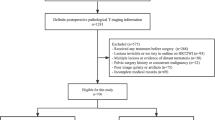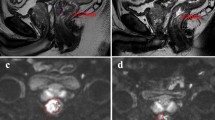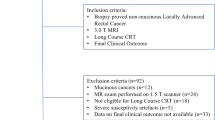Abstract
Purpose
To investigate the effects of deep learning-based imaging reconstruction (DLR) on the image quality of MRI of rectal cancer after chemoradiotherapy (CRT), and its accuracy in diagnosing pathological complete responses (pCR).
Methods
We included 39 patients (men: women, 21:18; mean age ± standard deviation, 59.1 ± 9.7 years) with mid-to-lower rectal cancer who underwent a long-course of CRT and high-resolution rectal MRIs between January 2020 and April 2021. Axial T2WI was reconstructed using the conventional method (MRIconv) and DLR with two different noise reduction factors (MRIDLR30 and MRIDLR50). The signal-to-noise ratio (SNR) of the tumor was measured. Two experienced radiologists independently made a blind assessment of the complete response on MRI. The sensitivity and specificity for pCR were analyzed using a multivariable logistic regression analysis with generalized estimating equations.
Results
Thirty-four patients did not have a pCR whereas five (12.8%) had pCR. Compared with the SNR of MRIconv (mean ± SD, 7.94 ± 1.92), MRIDLR30 and MRIDLR50 showed higher SNR (9.44 ± 2.31 and 11.83 ± 3.07, respectively) (p < 0.001). Compared to MRIconv, MRIDLR30 and MRIDLR50 showed significantly higher specificity values (p < 0.036) while the sensitivity values were not significantly different (p > 0.301). The sensitivity and specificity for pCR were 48.9% and 80.8% for MRIconv; 48.9% and 88.2% for MRIDLR30; and 38.8% and 86.7% for MRIDLR50, respectively.
Conclusion
DLR produced MR images with higher resolution and SNR. The specificity of MRI for identification of pCR was significantly higher with DLR than with conventional MRI.
Graphical abstract




Similar content being viewed by others
References
Bosset JF, Collette L, Calais G, Mineur L, Maingon P, Radosevic-Jelic L, et al. Chemotherapy with preoperative radiotherapy in rectal cancer. N Engl J Med 2006;355:1114-1123
Gérard JP, Conroy T, Bonnetain F, Bouché O, Chapet O, Closon-Dejardin MT, et al. Preoperative radiotherapy with or without concurrent fluorouracil and leucovorin in T3-4 rectal cancers: results of FFCD 9203. J Clin Oncol 2006;24:4620-4625
Maas M, Nelemans PJ, Valentini V, Das P, Rödel C, Kuo LJ, et al. Long-term outcome in patients with a pathological complete response after chemoradiation for rectal cancer: a pooled analysis of individual patient data. Lancet Oncol 2010;11:835-844
Smith FM, Cresswell K, Myint AS, Renehan AG. Is “watch-and-wait” after chemoradiotherapy safe in patients with rectal cancer? BMJ 2018;363:k4472
van der Valk MJM, Hilling DE, Bastiaannet E, Meershoek-Klein Kranenbarg E, Beets GL, Figueiredo NL, et al. Long-term outcomes of clinical complete responders after neoadjuvant treatment for rectal cancer in the International Watch & Wait Database (IWWD): an international multicentre registry study. Lancet 2018;391:2537-2545
Dattani M, Heald RJ, Goussous G, Broadhurst J, São Julião GP, Habr-Gama A, et al. Oncological and Survival Outcomes in Watch and Wait Patients With a Clinical Complete Response After Neoadjuvant Chemoradiotherapy for Rectal Cancer: A Systematic Review and Pooled Analysis. Ann Surg 2018;268:955-967
Chadi SA, Malcomson L, Ensor J, Riley RD, Vaccaro CA, Rossi GL, et al. Factors affecting local regrowth after watch and wait for patients with a clinical complete response following chemoradiotherapy in rectal cancer (InterCoRe consortium): an individual participant data meta-analysis. Lancet Gastroenterol Hepatol 2018;3:825-836
Dossa F, Chesney TR, Acuna SA, Baxter NN. A watch-and-wait approach for locally advanced rectal cancer after a clinical complete response following neoadjuvant chemoradiation: a systematic review and meta-analysis. Lancet Gastroenterol Hepatol 2017;2:501-513
López-Campos F, Martín-Martín M, Fornell-Pérez R, García-Pérez JC, Die-Trill J, Fuentes-Mateos R, et al. Watch and wait approach in rectal cancer: Current controversies and future directions. World J Gastroenterol 2020;26:4218-4239
Beets-Tan RGH, Lambregts DMJ, Maas M, Bipat S, Barbaro B, Curvo-Semedo L, et al. Magnetic resonance imaging for clinical management of rectal cancer: Updated recommendations from the 2016 European Society of Gastrointestinal and Abdominal Radiology (ESGAR) consensus meeting. Eur Radiol 2018;28:1465-1475
Gollub MJ, Arya S, Beets-Tan RG, dePrisco G, Gonen M, Jhaveri K, et al. Use of magnetic resonance imaging in rectal cancer patients: Society of Abdominal Radiology (SAR) rectal cancer disease-focused panel (DFP) recommendations 2017. Abdom Radiol (NY) 2018;43:2893-2902
Patel UB, Taylor F, Blomqvist L, George C, Evans H, Tekkis P, et al. Magnetic resonance imaging-detected tumor response for locally advanced rectal cancer predicts survival outcomes: MERCURY experience. J Clin Oncol 2011;29:3753-3760
Yoen H, Park HE, Kim SH, Yoon JH, Hur BY, Bae JS, et al. Prognostic Value of Tumor Regression Grade on MR in Rectal Cancer: A Large-Scale, Single-Center Experience. Korean J Radiol 2020;21:1065-1076
Battersby NJ, Dattani M, Rao S, Cunningham D, Tait D, Adams R, et al. A rectal cancer feasibility study with an embedded phase III trial design assessing magnetic resonance tumour regression grade (mrTRG) as a novel biomarker to stratify management by good and poor response to chemoradiotherapy (TRIGGER): study protocol for a randomised controlled trial. Trials 2017;18:394
Jameson MB, Gormly K, Espinoza D, Hague W, Asghari G, Jeffery GM, et al. SPAR - a randomised, placebo-controlled phase II trial of simvastatin in addition to standard chemotherapy and radiation in preoperative treatment for rectal cancer: an AGITG clinical trial. BMC Cancer 2019;19:1229
Jang JK, Lee JL, Park SH, Park HJ, Park IJ, Kim JH, et al. Magnetic resonance tumour regression grade and pathological correlates in patients with rectal cancer. Br J Surg 2018;105:1671-1679
Sclafani F, Brown G, Cunningham D, Wotherspoon A, Mendes LST, Balyasnikova S, et al. Comparison between MRI and pathology in the assessment of tumour regression grade in rectal cancer. Br J Cancer 2017;117:1478-1485
Seo N, Kim H, Cho MS, Lim JS. Response Assessment with MRI after Chemoradiotherapy in Rectal Cancer: Current Evidences. Korean J Radiol 2019;20:1003-1018
Horvat N, Veeraraghavan H, Khan M, Blazic I, Zheng J, Capanu M, et al. MR Imaging of Rectal Cancer: Radiomics Analysis to Assess Treatment Response after Neoadjuvant Therapy. Radiology 2018;287:833-843
Gormly KL. High-Resolution T2-Weighted MRI to Evaluate Rectal Cancer: Why Variations Matter. Korean J Radiol 2021;22:1475-1480
Kale SC, Chen XJ, Henkelman RM. Trading off SNR and resolution in MR images. NMR Biomed 2009;22:488-494
Wang X, Ma J, Bhosale P, Ibarra Rovira JJ, Qayyum A, Sun J, et al. Novel deep learning-based noise reduction technique for prostate magnetic resonance imaging. Abdom Radiol (NY) 2021;46:3378-3386
Kim M, Kim HS, Kim HJ, Park JE, Park SY, Kim YH, et al. Thin-Slice Pituitary MRI with Deep Learning-based Reconstruction: Diagnostic Performance in a Postoperative Setting. Radiology 2021;298:114-122
Hahn S, Yi J, Lee HJ, Lee Y, Lim YJ, Bang JY, et al. Image Quality and Diagnostic Performance of Accelerated Shoulder MRI With Deep Learning-Based Reconstruction. AJR Am J Roentgenol 2022;218:506-516
Park JC, Park KJ, Park MY, Kim MH, Kim JK. Fast T2-Weighted Imaging With Deep Learning-Based Reconstruction: Evaluation of Image Quality and Diagnostic Performance in Patients Undergoing Radical Prostatectomy. J Magn Reson Imaging 2022;55:1735-1744
Horvat N, Carlos Tavares Rocha C, Clemente Oliveira B, Petkovska I, Gollub MJ. MRI of Rectal Cancer: Tumor Staging, Imaging Techniques, and Management. Radiographics 2019;39:367-387
Park SH, Cho SH, Choi SH, Jang JK, Kim MJ, Kim SH, et al. MRI Assessment of Complete Response to Preoperative Chemoradiation Therapy for Rectal Cancer: 2020 Guide for Practice from the Korean Society of Abdominal Radiology. Korean J Radiol 2020;21:812-828
Mandard AM, Dalibard F, Mandard JC, Marnay J, Henry-Amar M, Petiot JF, et al. Pathologic assessment of tumor regression after preoperative chemoradiotherapy of esophageal carcinoma. Clinicopathologic correlations. Cancer 1994;73:2680-2686
Nagtegaal ID, Glynne-Jones R. How to measure tumour response in rectal cancer? An explanation of discrepancies and suggestions for improvement. Cancer Treat Rev 2020;84:101964
Jia X, Zhang Y, Wang Y, Feng C, Shen D, Ye Y, et al. MRI for Restaging Locally Advanced Rectal Cancer: Detailed Analysis of Discrepancies With the Pathologic Reference Standard. AJR Am J Roentgenol 2019;213:1081-1090
Siddiqui MR, Gormly KL, Bhoday J, Balyansikova S, Battersby NJ, Chand M, et al. Interobserver agreement of radiologists assessing the response of rectal cancers to preoperative chemoradiation using the MRI tumour regression grading (mrTRG). Clin Radiol 2016;71:854-862
van den Broek JJ, van der Wolf FS, Lahaye MJ, Heijnen LA, Meischl C, Heitbrink MA, et al. Accuracy of MRI in Restaging Locally Advanced Rectal Cancer After Preoperative Chemoradiation. Dis Colon Rectum 2017;60:274-283
Voogt ELK, Nordkamp S, van Zoggel D, Daniëls-Gooszen AW, Nieuwenhuijzen GAP, Bloemen JG, et al. MRI tumour regression grade in locally recurrent rectal cancer. BJS Open 2022;6
Santiago I, Rodrigues B, Barata M, Figueiredo N, Fernandez L, Galzerano A, et al. Re-staging and follow-up of rectal cancer patients with MR imaging when "Watch-and-Wait" is an option: a practical guide. Insights Imaging 2021;12:114
Jang JK, Lee CM, Park SH, Kim JH, Kim J, Lim SB, et al. How to Combine Diffusion-Weighted and T2-Weighted Imaging for MRI Assessment of Pathologic Complete Response to Neoadjuvant Chemoradiotherapy in Patients with Rectal Cancer? Korean J Radiol 2021;22:1451-1461
Acknowledgements
None
Funding
None.
Author information
Authors and Affiliations
Contributions
Conceptualization: BK, C-mL, JKJ, Formal analysis: JKJ, Investigation: BK, C-mL, Methodology: BK, JKJ, Project administration: JKJ, Resources: JK, S-BL, AYK, Supervision: JKJ, JK, S-BL, AYK, Visualization: BK, JKJ, Writing-original draft: BK, Writing-review & editing: C-mL, JKJ, JK, S-BL, AYK, Approval of final manuscript: All authors.
Corresponding author
Ethics declarations
Conflict of interest
The authors have no relevant financial or non-financial interests to disclose.
Ethical approval
This retrospective study was approved by the institutional review board in our center, and the requirement for written informed consent was waived.
Additional information
Publisher's Note
Springer Nature remains neutral with regard to jurisdictional claims in published maps and institutional affiliations.
Supplementary Information
Below is the link to the electronic supplementary material.
Rights and permissions
Springer Nature or its licensor (e.g. a society or other partner) holds exclusive rights to this article under a publishing agreement with the author(s) or other rightsholder(s); author self-archiving of the accepted manuscript version of this article is solely governed by the terms of such publishing agreement and applicable law.
About this article
Cite this article
Kim, B., Lee, Cm., Jang, J.K. et al. Deep learning-based imaging reconstruction for MRI after neoadjuvant chemoradiotherapy for rectal cancer: effects on image quality and assessment of treatment response. Abdom Radiol 48, 201–210 (2023). https://doi.org/10.1007/s00261-022-03701-3
Received:
Revised:
Accepted:
Published:
Issue Date:
DOI: https://doi.org/10.1007/s00261-022-03701-3




